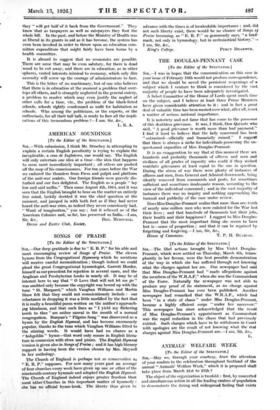THE DOUGLAS-PENNANT CASE
[To the Editor of the SPECTATOR.] SIR,—I was in hopes that the communication on this ease in your issue of February 13th would not produce correspondence, and that we should be saved the persistent reopenings of a subject which I venture to think is considered by the vast majority of people to have been adequately investigated.
A Select Committee of the House of Lords spent much time on the subject, and I believe at least three Prime Ministers have given considerable attention to it : and in fact a great deal of valuable time has been wasted over what, after all, is not a matter of serious national importance.
It is notoriety and not fame that has come to the possessor of this deathless grievance. It was, I think, Don Quixote who said, " A good grievance is worth more than bad payment." I find it hard to believe that the lady concerned has been " ostracized—officially and financially ruined." I suggest that there is always a niche for individuals possessing the un- questioned capacities of Miss Douglas-Pennant.
It is no exaggeration to say that at this moment there are hundreds and probably thousands of officers and men and civilians of all grades of capacity who could if they wished ventilate grievances at least equal to the one in question. During the stress of war there were plenty of instances of officers and men, from General and Admiral downwards, being silently removed from commands and posts, for sometimes sufficient and sometimes inadequate reason, according to the view of the individual concerned ; and in the vast majority of instances there was no inquiry and nothing approaching the turmoil and publicity of the case under review.
Does Miss Douglas-Pennant realize that more than one-tenth of nearly nine million men who were enlisted for the War lost their lives ; and that hundreds of thousands lost their jobs, their health and their happiness ? I suggest to Miss Douglas- Pennant that the most important thing she seems to have lost is—sense of proportion ; and that it can be regained by forgetting and forgiving.—I am, Sir, &c.,






























































 Previous page
Previous page